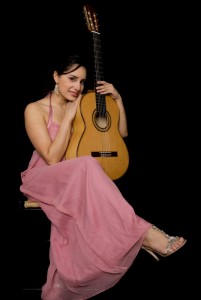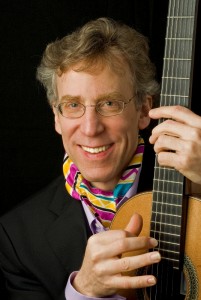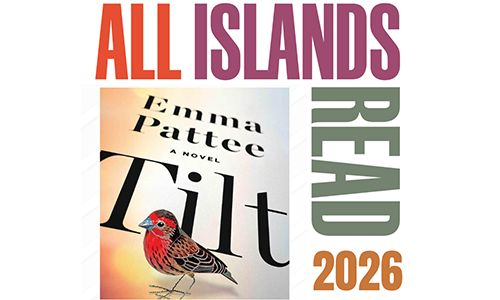
Zaira Meneses and her husband, Eliot Fisk, will be featured at the Fandango concerts Tuesday and Wednesday nights
Orcas~trations: Fandango! Concerts Tuesday and Wednesday evenings at the Chamber Music Festival
The Orcas~trations: Fandango! concerts of the 2010 Orcas Island Chamber Music Festival, present a “Wagnerian” type program in terms of length and variety, says OICMF Founder and Artistic Director Aloysia Friedmann. Featured artists Eliot Fisk and Zaira Meneses, as well as the [intlink id=”9699″ type=”post”]Miró Quartet[/intlink], have been “extraordinarily generous” in their festival participation this year, so that “at this festival, everyone gets so much music. But because of the variety, it won’t seem long,” says Aloysia.
Eliot Fisk is the last direct pupil of legendary classical guitarist Andrés Segovia, who praised Fisk as “at the top line of our artistic world.” Fisk also holds all reproduction rights to Segovia’s music, given to him by Segovia’s wife, Emilia. He is one of the world’s greatest classical guitarists and entertainers, and his wife, Zaira Meneses is “a brilliant guitarist in her own right,” says Aloysia.
Fisk is known world wide for his adventurous repertoire and willingness to take art music into unusual venues (including schools, senior centers and even prisons.) He devotes considerable energy to teaching. He is Professor at the Universität Mozarteum in Salzburg, Austria, where he teaches in five different languages, and in Boston at the New England Conservatory. His students have come from all corners of the earth.
Eliot Fisk has performed to dazzling critical and public acclaim in recital, as soloist with major orchestras and in a wide variety of chamber music combinations in most of the great concert halls of the world. In June of 2006, by order of King Juan Carlos of Spain, Eliot Fisk was awarded the Cruz of Isabel la Catótlica for his service to the cause of Spanish music. Earlier recipients of this rarely bestowed honor include Andrés Segovia and Yehudi Menuhin.
In addition to performing and teaching Fisk has expanded the repertoire for the guitar enormously through countless ground breaking transcriptions of works by Bach, Scarlatti, Haydn, Mozart, Paganini, and others as well as through commissions from a wide variety of leading composers His numerous transcriptions and editions are published by Universal, Presser, Ricordi and Guitar Solo Publications. His numerous recordings for the Musical Heritage Society, DGG, Arabesque, and EMI have elicited unqualified praise and even entered the Billboard charts as bestsellers.
Most of these recordings include repertoire never before performed on the guitar such as his legendary reading of the 24 solo violin Capricci, Op. 1 of Paganini (“Has to be heard to be believed!” — Ruggiero Ricci). His recordings of contemporary works by Berio and Robert Beaser’s Mountain Songs, which was nominated for a Grammy, will be heard live by Orcas audiences at the Fandango and Quintessential Quintets concerts. Guitar Review wrote that his versions of the complete Bach unaccompanied violin Sonatas and Partitas, BWV 1001-1006 “place him alongside Casals and Gould as one of this century’s greatest interpreters of Bach.”
His forays into unconventional territory have included collaborations with chanteuse, Ute Lemper; Turkish music master, Burhan Öçal; jazz guitar legend, Joe Pass; flamenco great, Paco Pena; and master of castanets, Lucero Tena. 2006-2007 season upcoming projects include four major premieres: Leonardo Balada’s “Caprichos” (seven movements after songs of Federico Garcia Lorca for guitar and string quartet),
Eliot Fisk is founder and director of Boston Guitar Fest, an annual event held in June at the New England Conservatory. This festival is dedicated to exploring cutting-edge possibilities of the guitar in an interdisciplinary cross-cultural context. He lives in Boston, Salzburg, and (whenever possible) in his beloved Granada, Spain, with his wife, acclaimed guitarist Zaira Meneses, and their young daughter. (From the website www.eliotfisk.com.).
Born in the province of Vera Cruz, Mexico, Zaira Meneses began musical studies at the age of seven in both voice and guitar. She was the recipient of numerous prizes for guitar performances both nationally and internationally. Beginning in 1998, she participated in outreach concerts for children in Vera Cruz, Puebla, Villa Hermosa, and other cities in her native Mexico.
That same year she also won first prize in the Paracho Michoacán International Guitar Competition and honorable mention in the National Guitar Competition of Xalapa. One year later she won the Competition of Guanajuato, Mexico and in the same year, was awarded a scholarship to the “Paco Marin” International Guitar Competition.
Zaira Meneses has participated in numerous international guitar festivals and distinguished herself not only as a soloist, but also as a founding member of the Orquesta de Guitarras of Xalapa with which she has toured throughout Mexico and abroad under the Baton of the legendary Alfonso Moreno. She performs widely as a guitar soloist and as a member of various chamber music to public and critical acclaim in both Europe and the America’s. She is also a featured performer at Boston Guitarfest each June. (From the website www.ZairaMeneses.com )
Although the couple summer in Granada, Spain, when Aloyisa was able to engage both Fisk and Meneses this season, she formulated the Fandango concerts for the final week of the Chamber Music Festival.
The classical music form of Fandango (a lively Andalusian folk dance, usually in triple meter and played with guitars, castanets and hand-clapping) has been used by many European composers, and often included in theatrical, concert and chamber works through the ages, from Scarlatti, Mozart and Boccherini to Joaquin Rodrigo in the 20th-century. Through much collaboration with Eliot and Zaira, Aloysia was made aware of a lot of the repertoire for guitar and chamber music that is represented in the Fandango concerts:
Vivaldi Concerto in G Major for two guitars and strings
Scarlatti Sonatas for solo guitar
JS Bach Ciaconna from D minor Violin Partita, arr. for solo guitar
Barber Adagio for Strings from String Quartet in B Major, Op. 11
Beethoven Grosse Fuge in B-flat Major, Op. 133
Rodrigo Fandango from Tonadilla for two guitars
Berio Duets for Two Guitars
Falla Danza Espanola from La Vida Breve
Latin American works by Lauro and Barrios-Mangore for Solo Guitar
Boccherini Fandango Quintet for Guitar and String Quartet No. 4 in D Major
The first part of the Fandango concerts will concentrate on pre-20th century composers, with the exception of Barber’s Adagio for Strings; while the second part of the concert features music from more recent Spanish and Latin American composers, with the exception of Boccherini, a contemporary of Beethoven.
Antonio Vivaldi Concerto in G Major for two guitars and strings will feature Eliot Fisk and Zaira Meneses, with the Miró Quartet and Toby Saks, cellist , Aloysia Friedmann, violist and Chee-Yun, violinist, joining them. A concerto is a composition where a solo instrument or voice is “displayed” against a larger ensemble or orchestra. This concerto was originally written by Vivaldi (1675-1741) for two mandolins and orchestra, but has been arranged by Fisk for two guitars.
Domenico Scarlatti Sonatas for solo guitar, also arranged by Fisk, (and performed by him as well) will be announced at performance time. “Sonata” is the three-part form employed not only in works actually entitled “Sonata” but also used in string quartets, trios, quintets, symphonies and overture. In the sonata form, one or more themes (each with a distinct “personality” are presented, then developed and finally recapitulated. Scarlatti (1685-1757) wrote “a massive collection of keyboard sonatas,” according to Jeff O’Kelly’s OICMF Program Notes.
JS Bach Ciaconna from D minor Violin Partita, arr. for solo guitar, will be played by Fisk. The Ciaconna or Chaconne is an early theme-and-variation form; arising from a slow stately dance in ¾ time where everyone danced for eight bars ,then a couple or a small group broke out into different figures. This composition has been described as an “incomparable example” of the chaconne. In it, the variations begin “on a harmonic progression heard in the first four bars. Each variation ends with a cadence leading directly into the next to form a monumental, almost mystical large-scale structure.” (O’Kelly)
The Samuel Barber Adagio for Strings from String Quartet in B Major, Op. 11, was introduced to many contemporary non-classical music audiences when played at President John Kennedy’s funeral, and when featured in the Vietnam War movie “Platoon.” Its “sinuous string lines gradually ascend stepwise to a searing climax before sinking to a quiet close.” (O’Kelly) It will be played by the Miró Quartet, who will also perform the Beethoven Grosse Fuge in B-flat Major, Op. 133.
Aloysia Friedmann commented on this composition, one of Beethoven’s last works, saying, “People think very classical when they think of Beethoven, and can be surprised by how avant garde this work is. It’s good for everyone to realize how controversial Beethoven could be in certain harmonic ways.”
Following the Intermission, Rodrigo’s Fandango from Tonadilla for two guitars will be performed by Eliot Fisk and Zaira Menenes.
Composer Joaquin Rodrigo was born in a town in Valencia, Spain and, after contracting diphtheria at the age of three, lost his sight. He began his music studies with piano and violin at the age of eight, and studied harmony and composition as a teenager, in Valencia and then in Paris.
Although he did not master the Spanish guitar himself, through his compositions, he bestowed dignity to the guitar as a universal concert instrument and is best known for his guitar music, in particular the Concerto de Aranjuez. This composition for guitar and orchestra has become well-known for the central Adagio movement, featuring interplay between the guitar and English horn. It was composed in 1939 in Paris, and in later life Rodrigo and his wife, Turkish-born pianist Victoria Kamhi, declared that it was written as a response to the miscarriage of their first child. The Adagio movement was later adapted by the conductor Gil Evans for Miles Davis’ 1960 album Sketches of Spain.. The Concerto was adapted by the composer himself for Harp and Orchestra and dedicated to Nicanor Zabaleta..
The success of this concerto led to commissions from a number of prominent soloists, including the flautist James Galway and the cellist Julian Lloyd Webber. On 30 December 1991, Rodrigo was awarded the hereditary title, Marques de los Jardines de Aranjuez and in 1996, he received Spain’s highest civilian honor, the Prince of Asturias Award.
Berio’s Duets for Two Guitars will also feature Fisk and Meneses. “For those who are afraid of 20th century music, I should add that … these duets are quite pleasant, even charming,” says O’Kelly. Berio composed and arranged throughout his long life for both acoustic and electronic music.
Luciano Berio was taught piano by his father and grandfather. During World War II he was conscripted into the army, but on his first day he injured his hand while learning how a gun worked. As a result, he was unable to continue studying the piano after the war and turned to composition. Berio made a living at this time accompanying singing classes, and it was in doing this that he met American mezzo-soprano Cathy Berberian, whom he married shortly after graduating, and for whose voice Berio wrote many pieces.
In 1951, Berio went to the United States to study and developed an interest in serialism, and later, in electronic music. He founded an electronic music studio in Milan in 1955, and invited a number of significant composers to work there, including Henri Pousseur and John Cage. Berio also produced an electronic music periodical, Incontri Musicali.
One of the most influential works he produced there was Thema (Omaggio a Joyce) (1958), based on his wife’s reading from James Joyce’s Ulysses. A later work, Visage (1961) sees Berio creating a wordless emotional language by cutting up and rearranging a recording of Cathy Berberian’s voice.
Beginning in 1960, Berio began composing and teaching in the U.S. at the Tanglewood Music Festival, Mills College and Juilliard School where he founded the Juilliard Ensemble, a group dedicated to performances of contemporary music. In 1966, he again married, this time to the noted philosopher of science Susan Oyama. Among his students were Phil Lesh of the Grateful Dead.
In 1968, Berio completed O King in memory of Martin Luther King, Jr. In it, the voice(s) intones first the vowels, and then the consonants which make up his name, only stringing them together to give his name in full in the final bars.The orchestral version of O King was, shortly after its completion, integrated into what is perhaps Berio’s most famous work, Sinfonia, for orchestra and eight amplified voices. The voices are not used in a traditional classical way; they frequently do not sing at all, but speak, whisper and shout. It was originally written as a radio program for five actors, and reworked in 1975 for eight vocalists and an optional keyboard part. The work is one of a number of collaborations with the poet Edorado Sanguineti, who for this piece provided a text full of quotations from sources including the Bible, T.S. Eliot and Karl Marx.
As well as original works, Berio made a number of arrangements of works by other composers, from Monteverdi and Purcell to Brahms, Mahler and Kurt Weill. He wrote and ending for Puccini’s opera Turandot,and completed sketches by Franz Schubert for his Symphony No. 10 and by adding music derived from other Schubert works. (Wikipedia)
The Selections from his 34 Duets featured at the Chamber Music Festival all are named for musicians, most of whom were friends or acquaintances of Berio. (O’Kelly)
Falla Danza Espanola from L a Vida Breve, performed by Fisk and Meneses.
Manuel de Falla’s earliest music teacher was his mother; at the age of nine he was introduced to his first piano professor. From the late 1890s he studied piano and composition in Madrid. In 1899, by unanimous vote, he was awarded the first prize at the piano competition at his school of music. During this time Falla became interested in native Andalusian music. His first important work was the one-act opera La Vida Breve (Life is Short, or The Brief Life, written in 1905, though revised before its premiere in 1913).
Falla spent the years before World War I in Paris, but it wasn’t until he returned to Madrid in 1914 that he began composing his best known pieces, including two ballets. From 1921 to 1939 Manuel de Falla lived in Granada and wrote several works, including the puppet opera, Master Peter’s Puppet Show, 1923 and a concert fro harsibchord and chamber ensemble that introduce the harpsichord to the modern orchestra. “In these works, the Spanish folk influence is somewhat less apparent than a kind of Stravinskian neoclassicism.” Wikipedia)
Also in Granada, Falla began work on the large-scale orchestral cantata Atlantis, based on the Catalan text L’Atlantida by Jacint Verdaguer. “Falla considered Atlàntida to be the most important of all his works; posterity has not agreed with this verdict, and performances of the piece have been extremely rare. Verdaguer’s text gives a mythological account of how the submersion of Atlantis created the Atlantic ocean, thus separating Spain and Latin America, and how later the Spanish discovery of America reunited what had always belonged together.” (Wikipedia) Falla continued work on the cantata after moving to Argentina in 1939, following Franco’s victory in the Spanish Civil War. Following his death, his remains were returned to Spain.
Zaira Meneses will perform Latin American works by Lauro and Barrios-Mangore for Solo Guitar; she will also perform on the castanets as Eliot Fisk and the Miró Quartet play Boccherini’s Fandango Quintet for Guitar and String Quartet No. 4 in D Major. Boccherini was Italian by birth, but lived most of his life in Spain, where he gained familiarity with the guitar. As well as 12 cello concerti, he composed over 100 string quartets.
This piece was a reworking of movements for other of Boccherini’s string quartets, with a first movement pastorale, and a second movement allegro. Tthe third movement, the fandango, “seems well on its way to rivaling the popularity” of Boccherini’s most well known piece, a minuet from a string quartet, that single-handedly kept Boccherini’s reputation alive for over 200 years. (O’Kelly)
In the fandango movement, “The instruments play increasingly elaborate, even fantastic, variations …. These passages ratchet up the tension relentlessly leading to a palpable sense of release each time the main theme returns. The inclusion of castanets and tambourine add to the tension and rhythmic vigor in the latter part of the movement. Thrown in along the way are some whistling harmonics and sexy slides for the cello. In fact, “sexy” could be used to describe the whole movement – evidence that epithets like “cool” and “emotionally detached” are not entirely accurate when used to describe music of the classical period.” (O’Kelly).
Orcas~trations: Fandango! Sponsors
The National Endowment for the Arts is the sponsor of the August 24 concert at 7:30 p.m. The pre-concert talk is sponsored by Margaret and John Greever, and Josie and Wally Barrow sponsor the reception following the concert. On Wednesday, August 25, Sallie Bell is the Orcas~trations: Fandango! concert sponsor. Sonia and David Alexander are the post-concert talk sponsors, and Becky and Dick Greaves provide the post-concert reception.
Waiting List policy
OICMF Executive Director Victoria Parker says, “A very productive waiting list is offered for each concert (with the exception of the Children’s Concert). When tickets become available through returns or traded nights, staff will call those on the Waiting List in the order of their inclusion.
“Every reasonable effort will be made to contact those on the list. Approximately 30 minutes before a concert begins, the waiting list will be abandoned and hopeful patrons waiting in the lobby will be offered any tickets that are still available. Seats that are not occupied by Intermission will be resold at a reduced price.”
Tickets may be purchased at www.oicmf.org or by calling 360-376-6636 or toll-free at 866-492-0003.
**If you are reading theOrcasonian for free, thank your fellow islanders. If you would like to support theOrcasonian CLICK HERE to set your modestly-priced, voluntary subscription. Otherwise, no worries; we’re happy to share with you.**









I am hoping to find information on a rare classical guitar I recently purchased. The interior label reads Calatayud y Gisbert, S&L Valencia Spain.
I appreciate any assistance you can offer or where I may inquire for information.
Sincerely,
Cheryl Antunes